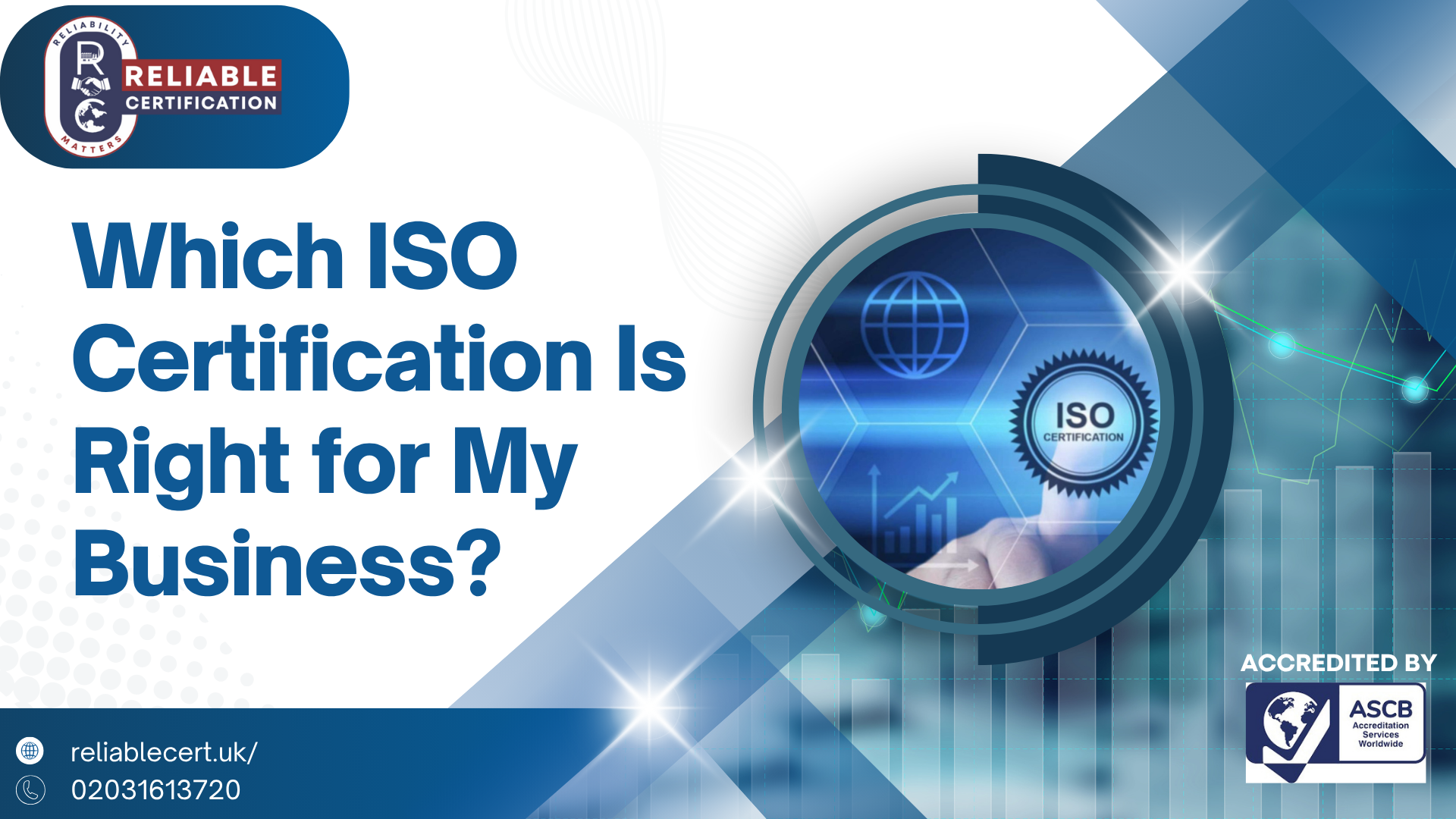Discover which ISO certification is best for your business. Learn the differences between ISO 9001, 27001, 14001, and more in this clear, expert guide.

In today’s competitive landscape, gaining customer trust and standing out in your industry is more important than ever. One of the most effective ways to showcase your business’s commitment to quality, safety, efficiency, and sustainability is by obtaining an ISO certification. But with so many ISO standards available, it’s normal to feel overwhelmed trying to figure out which one is right for your business.
In this blog, we’ll guide you through the most popular ISO certifications, explain what they mean, who they’re for, and how to choose the best fit for your organisation. Whether you're a startup or an established enterprise, understanding the right certification can elevate your operations, open up new business opportunities, and improve customer confidence.
ISO certification is an official recognition that a company complies with standards developed by the International Organization for Standardization (ISO). These standards serve as frameworks to ensure quality, safety, efficiency, and sustainability across industries and business operations.
Getting ISO certified means your business has implemented a management system that aligns with international best practices and has been audited and approved by an accredited certification body.
Before diving into which certification you should get, let’s understand why ISO certification is worth pursuing in the first place:
An ISO certification proves your company follows international standards, helping you stand out from competitors.
Many government and large corporate tenders require ISO-certified suppliers.
ISO standards are designed to streamline processes, reduce waste, and improve output quality.
A structured management system gives your team clarity, direction, and consistency.
Standards like ISO 45001 or ISO 14001 help businesses meet health, safety, and environmental laws.
Not every business needs every ISO standard. The best approach is to match the standard to your goals, industry, and customer expectations.
Here’s a breakdown of the most widely used ISO certifications and who they’re ideal for:
Best For: All businesses, regardless of size or sector.
ISO 9001 is the world’s most popular ISO standard. It focuses on quality management principles such as customer satisfaction, continual improvement, and efficient processes.
If your business deals with products or services and wants to prove quality consistency, ISO 9001 certification is a great start.
Learn more about ISO 9001
Best For: Businesses with environmental impacts – manufacturers, construction firms, logistics companies, etc.
ISO 14001 helps companies reduce their environmental footprint by managing waste, energy, and sustainability initiatives.
If you want to show customers and stakeholders that you're committed to reducing environmental harm, this is the certification for you.
Best For: IT companies, finance, healthcare, legal, and any organisation handling sensitive data.
ISO 27001 focuses on protecting sensitive data through risk management, secure data processes, and access control.
If data is the backbone of your business and you want to show you're serious about information security, ISO 27001 certification is essential.
Best For: High-risk industries like construction, engineering, logistics, or any business focused on worker safety.
ISO 45001 provides a structured approach to managing workplace risks and improving employee safety.
If your operations involve physical risks or regulated safety standards, this certification helps you stay compliant and responsible.
Best For: Food manufacturers, processors, packagers, transporters, retailers, and caterers.
ISO 22000 ensures that food is safe for consumption through risk management across the food chain.
If you operate in the food or beverage sector, this certification is practically a necessity to remain competitive.
Best For: Energy-intensive industries like manufacturing, transportation, and construction.
ISO 50001 helps organisations systematically manage energy use, improve energy efficiency, and reduce operational costs.
If you're working toward net zero or want to demonstrate environmental leadership, this certification is a smart investment.
Best For: Medical device manufacturers and related businesses in the healthcare sector.
ISO 13485 builds on ISO 9001 but with specific requirements for the design, production, and servicing of medical devices.
If you operate in the medical or health tech industry, ISO 13485 certification helps prove your product meets rigorous health standards.
Best For: Companies that want to combine multiple ISO standards into one streamlined system.
Many businesses choose to integrate systems like ISO 9001, 14001, and 45001 under one umbrella for easier management and auditing.
If your company operates across departments or industries and wants to manage multiple risks efficiently, an Integrated Management System might be the way forward.
Still unsure which path to take? Consider these questions:
Some industries require specific certifications (e.g., ISO 22000 for food businesses).
Many corporate supply chains only work with ISO-certified vendors.
Choose a standard that addresses your most urgent business challenges.
International buyers often require ISO compliance to consider your products or services.
Once you’ve decided which ISO certification is right for your business, here’s a simplified overview of the process:
There’s no one-size-fits-all ISO standard. The right certification depends on your business goals, industry risks, customer expectations, and legal requirements. Whether it’s about boosting quality, securing data, or reducing your carbon footprint, ISO certification adds real, measurable value to your business.
Ready to take the first step toward ISO certification? Contact us at Reliable Certification to book a free consultation today!
Getting certified is a big step but you don’t have to do it alone. At Reliable Certification, we help businesses across the UK (and internationally) achieve and maintain ISO certifications with ease.
Whether you're aiming for ISO 9001, ISO 27001, or a full Integrated Management System, our team is ready to help you get certified—fast, professionally, and hassle-free
Typically replies within 30 minutes